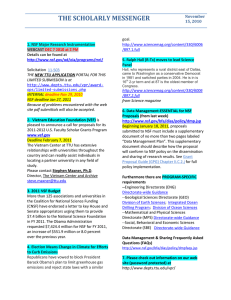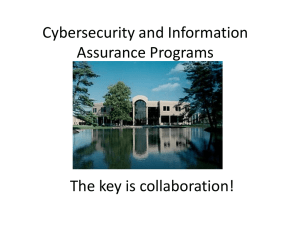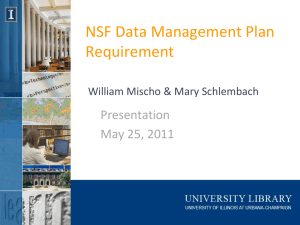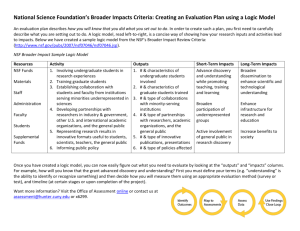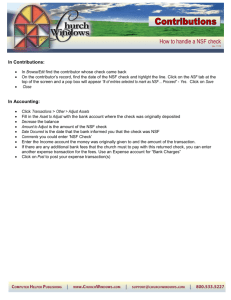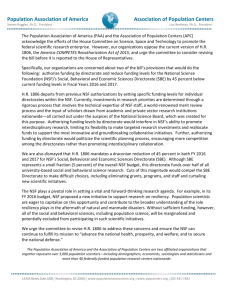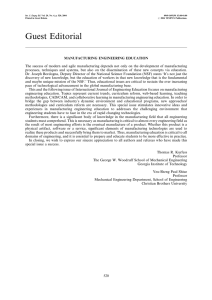THE SCHOLARLY MESSENGER
advertisement
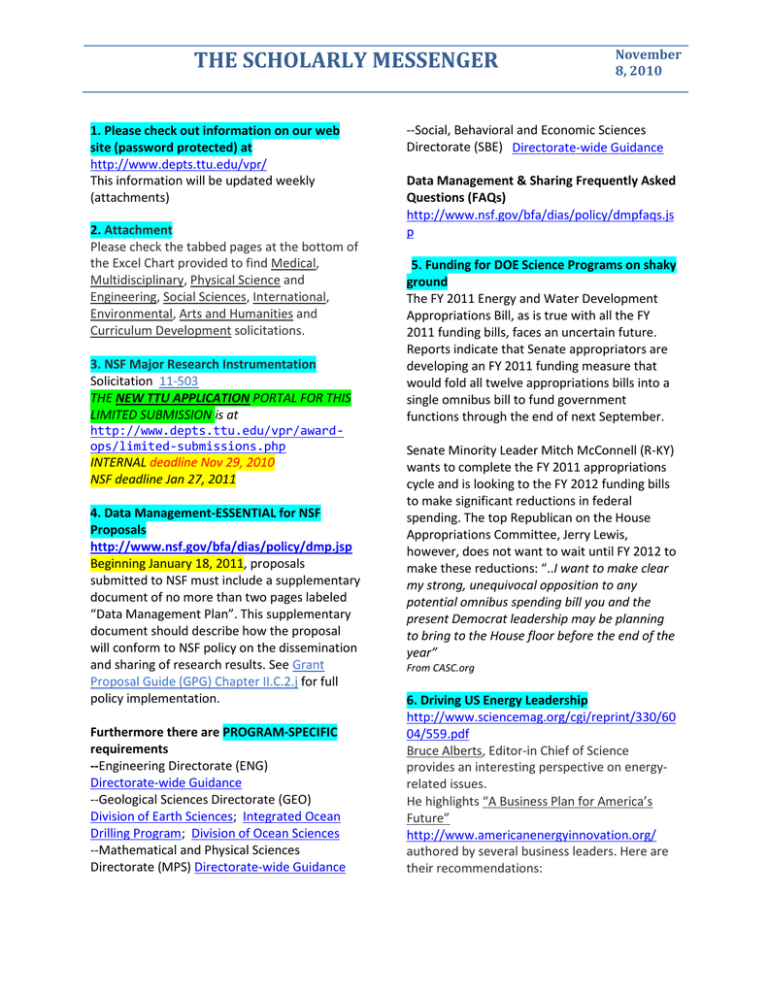
THE SCHOLARLY MESSENGER 1. Please check out information on our web site (password protected) at http://www.depts.ttu.edu/vpr/ This information will be updated weekly (attachments) 2. Attachment Please check the tabbed pages at the bottom of the Excel Chart provided to find Medical, Multidisciplinary, Physical Science and Engineering, Social Sciences, International, Environmental, Arts and Humanities and Curriculum Development solicitations. 3. NSF Major Research Instrumentation Solicitation 11-503 THE NEW TTU APPLICATION PORTAL FOR THIS LIMITED SUBMISSION is at http://www.depts.ttu.edu/vpr/awardops/limited-submissions.php INTERNAL deadline Nov 29, 2010 NSF deadline Jan 27, 2011 4. Data Management-ESSENTIAL for NSF Proposals http://www.nsf.gov/bfa/dias/policy/dmp.jsp Beginning January 18, 2011, proposals submitted to NSF must include a supplementary document of no more than two pages labeled “Data Management Plan”. This supplementary document should describe how the proposal will conform to NSF policy on the dissemination and sharing of research results. See Grant Proposal Guide (GPG) Chapter II.C.2.j for full policy implementation. Furthermore there are PROGRAM-SPECIFIC requirements --Engineering Directorate (ENG) Directorate-wide Guidance --Geological Sciences Directorate (GEO) Division of Earth Sciences; Integrated Ocean Drilling Program; Division of Ocean Sciences --Mathematical and Physical Sciences Directorate (MPS) Directorate-wide Guidance November 8, 2010 --Social, Behavioral and Economic Sciences Directorate (SBE) Directorate-wide Guidance Data Management & Sharing Frequently Asked Questions (FAQs) http://www.nsf.gov/bfa/dias/policy/dmpfaqs.js p 5. Funding for DOE Science Programs on shaky ground The FY 2011 Energy and Water Development Appropriations Bill, as is true with all the FY 2011 funding bills, faces an uncertain future. Reports indicate that Senate appropriators are developing an FY 2011 funding measure that would fold all twelve appropriations bills into a single omnibus bill to fund government functions through the end of next September. Senate Minority Leader Mitch McConnell (R-KY) wants to complete the FY 2011 appropriations cycle and is looking to the FY 2012 funding bills to make significant reductions in federal spending. The top Republican on the House Appropriations Committee, Jerry Lewis, however, does not want to wait until FY 2012 to make these reductions: “..I want to make clear my strong, unequivocal opposition to any potential omnibus spending bill you and the present Democrat leadership may be planning to bring to the House floor before the end of the year” From CASC.org 6. Driving US Energy Leadership http://www.sciencemag.org/cgi/reprint/330/60 04/559.pdf Bruce Alberts, Editor-in Chief of Science provides an interesting perspective on energyrelated issues. He highlights “A Business Plan for America’s Future” http://www.americanenergyinnovation.org/ authored by several business leaders. Here are their recommendations: THE SCHOLARLY MESSENGER a) Create an independent national energy strategy board b) Invest $16B/ yr in clean energy innovation c) Create Centers of Excellence with strong domain expertise d) Fund ARPA-E at $1B/yr e) Establish and fund a New Energy Challenge Program to build large scale pilot projects 7. Nobelist “coach” takes on US Science Education http://www.sciencemag.org/cgi/content/full/ 330/6004/572 Carl Wieman, (2001 Nobel Prize in Physics for creating the first Bose-Einstein condensates) is Associate Director for Science in the White House Office of Science and Technology Policy. Wieman has spent more than a decade understanding how students learn. He highlights the roles of appropriate “coaching”, “motivating”, “feed-back” and “musclememory-like training”. In this interview his response to the following question is interesting: Why is it so hard for universities to improve undergraduate science instruction? C.W.: I don't think that's the right question. The right question is, "Why isn't science instruction better?" A big reason is that the research we've been talking about is very recent. And when you've been doing something the same way for hundreds of years, it takes a while to be convinced that you need to change. There's also the problem of incentives. We don't have good metrics for measuring how to improve learning.” 8. Epigenetics and Cancer DNA methylation (the addition of methyl groups onto DNA) is now believed to play a role in cancer. An epigenetics dream team has received more than $9 million from the Stand Up To Cancer campaign to help fund the first phase II clinical trials to test DNA demethylating drugs—already used successfully to treat a blood cancer—for solid tumors such as lung November 8, 2010 cancer. The goal of this research is to “reprogram” DNA methylation in cancer cells to make them “normal” http://www.sciencemag.org/cgi/content/full/33 0/6004/576 th From the Oct 29 issue of Science 9. National Endowment of the Arts Research Reports http://www.nea.gov/research/ResearchReports _chrono.html Summaries of various funded projects from the NEA. Many are survey-based projects. 10. From the National Endowment for the Humanities What can literature teach us about treating trauma victims? Find out at After Shock: Humanities Perspectives on Trauma in Washington, DC, November 12-13, an innovative conference for health care professionals who work with veterans and others who have experienced trauma, organized by the Maine Humanities Council. 11. Sustaining the Data and Bioresource Commons (from last week) http://www.sciencemag.org/cgi/content/full/33 0/6004/592 Interesting article authored by a high-level team on the need for a “social contract” between the funding agencies and scientific community.. a must read!!! (from Science Policy Forum) 12. Up-coming NSF Advisory Committee Meetings (from last week) November 18, 2010 - November 19, 2010 SBE Fall 2010 Advisory Committee Meeting 13. Haragan lecture this Friday 6 PM Biology Lecture Hall 100 Dr. Lynda Bonewald, Interim VC Research U Missouri-Kansas “Challenging Dogma to Discover the Multifunctional Osteocyte”
